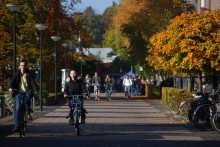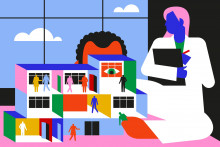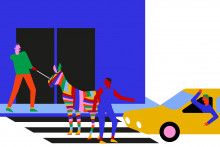round-table discussion
U-Today organised a round-table discussion about diversity, equity and inclusion at the University of Twente. Participants of the event, held last week in U-Parkhotel, were: Canan Acar (Assistant Professor at the Faculty of Engineering Technology), Franziska Baack (PhD at the Faculty of Engineering Technology), Udipta Boro (PhD at ITC faculty), Saskia Lindhoud (Associate Professor at Molecular Nanofabrication, Faculty of Science and Technology), Lais Denz (Master student of Industrial Design Engineering), Jutta Arens (Professor and Chair of Engineering Organ Support Technologies, Faculty of Engineering Technology), Petra Weber (Management Assistant, ITC faculty) and Bene Aschenneller (PhD at ITC Faculty).

How could the University of Twente become more inclusive? The first step could be making UT decision-making bodies more diverse, and ensuring that not only top management and full professors are involved.
Saskia Lindhoud: ‘There is this concept of reverse mentoring. While a mentor is usually someone who is higher up the hierarchy, in this case it’s reverse. Someone from a higher layer is asking someone lower about their experiences, about what type of barriers and challenges they need to cross and how the management could improve this. This concept could be applied at so many layers of the organisation.’
'There should be a university-wide rule on who should sit on each body'
Jutta Arens: ‘In Germany, various layers of the organisation are included more. At faculty meeting and other meetings where decisions are made, there are always students and support staff members included alongside academics and management. This is embedded in law to make sure that their perspectives are taken into account. This structure has its origins in the 1960’s, at the time Germany was in the process of Denazification of universities. There should be a university-wide rule on who should sit on each body, who should be involved in each meeting.’
Saskia Lindhoud: ‘I think that would definitely increase diversity and inclusion, because more voices would be included. The structure is there in some way and in a different form. Every faculty board has its own student assessor, for instance. And we have faculty councils. But there are also other decision making units within the UT – research domain specific, in my faculty, with only full professors on board. Whatever decisions they come to – and they may have more impact than decisions that go through the faculty council – are not transparent or communicated. I feel like there is a lot of information that isn’t passed down or up because only the top management is included in meetings.’

Do UT students and staff members know where to turn to for help in case they experience discrimination or exclusion? The help structure at the UT seems to be well hidden for most.
Lais Denz: ‘There is no structure to help you or represent you if you feel excluded or discriminated. If you raise an issue, you are told to go to a study advisor for help. But that often leads nowhere. Furthermore, it’s not the victim’s or survivor’s role to seek defence. If someone experiences abuse, there should be a structure to represent them and advocate for them. There is a student queer association at the UT, but I feel like they are only for fun, for organising gathering, but not for representation. There is nobody that says ‘if you have a problem, come to us’. A frequent reply after reporting transgressive behaviour is: 'Don't worry, that's very typical of them' or 'You either love them or hate them'. Instead the reply should be 'we could support you in this manner or make those consequences happen, how would you like us to help you?'
‘It doesn’t help that the structure is there. You need to know that it’s there’
Petra Weber: ‘I happen to know that there are confidential advisors and a full House of Integrity structure, but these are almost impossible to find on the website. I do think that there is a structure in place – there are advisors, an ombudsman, there is an incentive fund for diversity projects, there is the DE&I office – but this is not obvious and information is hard to come by. It doesn’t help that the structure is there, you need to know that it’s there. And since we are talking about solutions: there is always an option to start up something new. You can start a group that has a serious purpose, so that students can choose if they want to join a group for the fun or a more serious approach.’
Jutta Arens: ‘I also think that it’s hard for students to go to an ombudsperson. I think it’d be easier if it was someone who was on their level, a peer. For example, in Germany it’s common that there are specific student associations per each faculty, associations dedicated to helping other students, so that it’s clear where students can go.’

What is a common problem when it comes to exclusion? Awareness is often lacking. Exclusion and discrimination could be partly prevented if more people at the UT became aware of potentially problematic behaviour. Through mandatory trainings.
Jutta Arens: ‘We should start a mandatory awareness training for all staff members. I think that would also go a long way. An unconscious bias training for instance.’
Udipta Boro: ‘I was going to say something similar. When there are DE&I events at the UT, you always see the same people there. People who are already sensitive to the topic and interested, but you don’t see the people who should actually attend these events to educate themselves.’
‘The people who need it, will never go there’
Jutta Arens: ‘The people who need it most, will never go there. That is why we need a mandatory awareness training. Also when it comes to attracting new staff and writing suitable vacancies. For example, a brochure for a new vacancy, which we really hoped could be filled by a woman, contained only pictures of male scientists. When I asked: “Why aren’t there any photos of women? Don’t we have some?” it became apparent, that the men who provided the pictures for the brochure were simply not thinking about the fact that it would not be very attractive to women. In the end we were able to have a balanced depiction of female and male researchers and could hire a female professor.’

What structural changes are needed to make the UT more inclusive? Based on the shared stories, there is currently no UT-wide culture or commitment when it comes to diversity and inclusion. There are too many local nuances and huge differences between individual faculties, departments and teams.
Petra Weber: ‘Hierarchy, attitude towards internationals, gender balance… it all differs so vastly between groups. This is also dangerous. Because if everything is going well in your own group, you may find it hard to even imagine that it’s different elsewhere.’
‘As a university, you need to take action against structural discrimination’
Lais Denz: ‘We have spoken a lot about personal discrimination but not so much about structural discrimination. When I started studying here, I was essentially homeless. I started searching for accommodation as soon as I got the letter that I was accepted to the UT, but I couldn’t find anything. I had nowhere to live, so I asked the UT for help. They simply responded that they had no room for me. All the student houses were completely full and blocked because they only accepted Dutch people. As a university, you need to take action against structural discrimination. If there are groups who struggle more in certain situations, such as internationals in finding affordable housing, then you need to give these groups priority. You need to give them additional help, that is how you create equity. The UT as a large institution has the capacity of building structures to counteract discrimination.’
Franziska Baack: ‘I agree. There is a lack of commitment from the UT. There is a Diversity week once a year. It’s like, ‘now we have a diversity week. Check for us, now we are done’. The week finishes and no discrimination exists. On a similar note: the UT has made a commitment to be an English speaking institution. A few years ago, they officially switched to English, but this effort feels very half-hearted. A lot of administration is still only in Dutch. For example, when I was sick and therefore not in full possession of my faculties, I received a long email from HR all in Dutch. Those were definitely the times when I felt excluded simply because I’m not Dutch.’

There are specific groups that are systematically disregarded, such as non-binary people and external PhD candidates.
Udipta Boro: ‘It’s a similar story with some official documents. For example, the official PhD Charter only uses the pronoun ‘he’ to refer to a PhD candidate. It completely disregards women and non-binary people. The same goes for the HR dashboard. In the system, you can find statistics about UT population, but people are only divided into ‘women’ and ‘men’. There is no other option than ‘he’ or ‘she’. On top of that, the genders are represented in a very stereotypical way. Women in bright pink and men in dark blue. Other gender identities are completely disregarded.’
‘Other gender identities are completely disregarded’
Canan Acar: ‘I’ve actually complained about this. The response I got was that if I’m triggered by ‘he’, I should also be triggered by the word ‘human’, because it has ‘man’ in it. I always wonder if I’m just excessively triggered or if I see something that others are simply unaware of. I think the university should take a firmer stand. These things should not differ so vastly group per group.’
Franziska Baack: ‘I also realize how privileged I am to have a European passport. Non-European PhDs need to get visas, which are 100% tied to their contracts. Once your contract finishes, you will lose your visa. When such a situation happens, supervisors often say that they can’t help. They don’t see it as their problem. And it is not their fault, but they need to be more aware and compassionate.’
‘External PhDs face structural inequality’
Bene Aschenneller: ‘Indeed, external PhDs face structural inequality. Another problem is their wage. While a regular PhD gets, let’s say, about 2000 euros, the external PhD will get about 1000 euros. Try paying your rent and your food with that. It’s impossible.’

Petra Weber: ‘Not only that. These PhDs are the only group that does not get a Christmas present from the UT. They are also excluded from team building activities, because those are officially only for employees. We get a budget for our group, 50 euro per person. With PhD not counted as employees. To include them, we simply have to accept that we go to less-expensive activities. Mind you, no staff member ever complains about this, everybody feels it is better to include the PhDs in the group activities. These inequalities are not only the UT’s fault. A lot of it is embedded in national laws and rules, such as the visas and tax details. The UT can’t solve all the problems, but it could communicate more openly about it.’
Franziska Baack: ‘But the UT can solve some problems.’
Udipta Boro: ‘We need to move beyond just symbolism. It’s great that we raise the pride flag every year or paint one bench with rainbow colours or change the letters in front from University to Diversity. But it should not just stop there. As an institution, the UT should try to embed diversity and inclusion in its day-to-day practices, and not because it is a trendy or woke thing to do but because it is an important and necessary thing to do. Maybe a participatory approach could help while designing Diversity & Inclusion policies. And this kind of discussion is also one step toward spreading awareness.’








